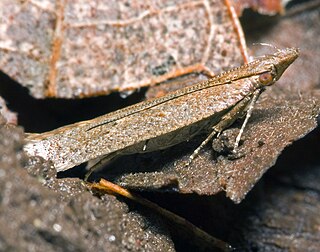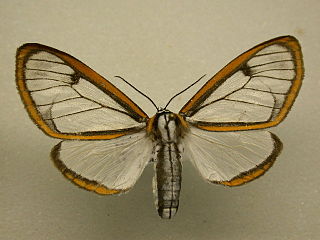
The Elachistidae are a family of small moths in the superfamily Gelechioidea. Some authors lump about 3,300 species in eight subfamilies here, but this arrangement almost certainly results in a massively paraphyletic and completely unnatural assemblage, united merely by symplesiomorphies retained from the first gelechioid moths.

The Gelechiidae are a family of moths commonly referred to as twirler moths or gelechiid moths. They are the namesake family of the huge and little-studied superfamily Gelechioidea, and the family's taxonomy has been subject to considerable dispute. These are generally very small moths with narrow, fringed wings. The larvae of most species feed internally on various parts of their host plants, sometimes causing galls. Douglas-fir (Pseudotsuga) is a host plant common to many species of the family, particularly of the genus Chionodes, which as a result is more diverse in North America than usual for Gelechioidea.

Heteropteryx is a monotypic genus of stick insects containing Heteropteryx dilatata as the only described species. and gives its name to the family of the Heteropterygidae. Their only species may be known as jungle nymph, Malaysian stick insect, Malaysian wood nymph, Malayan jungle nymph, or Malayan wood nymph and because of their size it is commonly kept in zoological institutions and private terrariums of insect lovers. It originates from the Malay Archipelago and is nocturnal.

Hyblaea is a genus of moths of the family Hyblaeidae first described by Johan Christian Fabricius in 1793.

Hyalurga is a genus of tiger moths in the family Erebidae. The genus was erected by Jacob Hübner in 1819.

Isostola is a genus of moths in the family Erebidae described by Felder in 1874.
Amata dilatata is a species of moth of the family Erebidae first described by Snellen in 1880. It is found on Sumatra, Nias, Peninsular Malaysia, Borneo and the Natuna Islands.

Phavaraea dilatata is a moth of the family Notodontidae. It is found in South America, from French Guiana to southeastern Brazil.
Bosara dilatata is a moth in the family Geometridae. It is found on Borneo, Peninsular Malaysia, Sulawesi and on New Guinea.

The Pericopina is a subtribe of tiger moths in the family Erebidae. The subtribe was described by Francis Walker in 1869.
Isostola albiplaga is a moth of the family Erebidae. It was described by Hering in 1925. It is found in Colombia.

Isostola divisa is a moth of the family Erebidae. It was described by Francis Walker in 1854. It is found in Brazil and French Guiana.
Isostola flavicollaris is a moth of the family Erebidae. It was described by Hering in 1925. It is found in Panama.
Isostola philomela is a moth of the family Erebidae. It was described by Herbert Druce in 1893. It is found in Colombia.
Isostola rhodobroncha is a moth of the family Erebidae. It was described by Felder in 1874. It is found in Brazil.
Isostola tenebrata is a moth of the family Erebidae. It was described by Erich Martin Hering in 1925. It is found in Bolivia.
Isostola thabena is a moth of the family Erebidae. It was described by Paul Dognin in 1919. It is found in Colombia.
Isostola vicina is a moth of the family Erebidae. It was described by Arthur Gardiner Butler in 1876. It is found in South America.

Isostola nigrivenata is a moth of the family Erebidae. It was described by Hering in 1925. It is found in Colombia and Costa Rica.
Hyblaea dilatata is a moth in the family Hyblaeidae described by Max Gaede in 1917.








